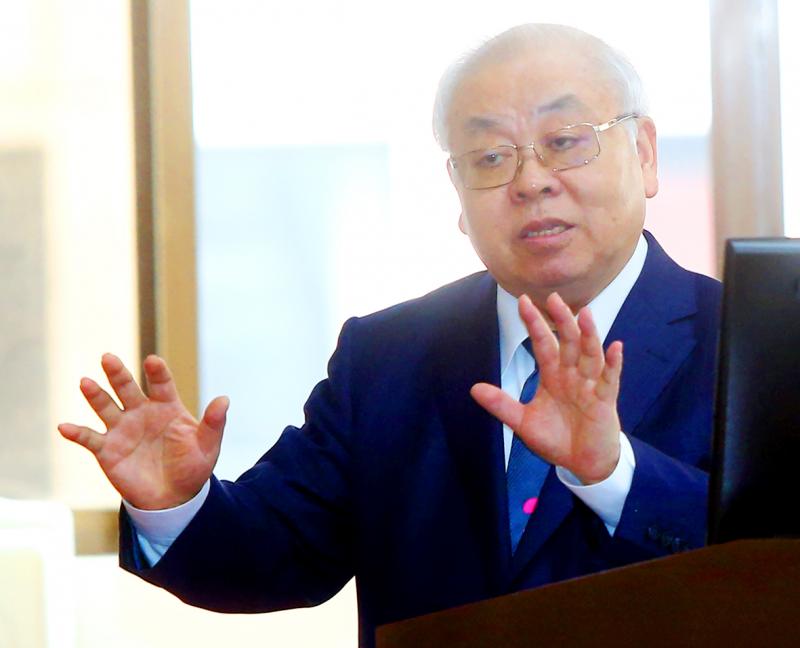Taiwan’s economy could manage to grow more than 2 percent this year even if shocks from the COVID-19 pandemic persist through the second quarter, as a government stimulus program would lend support, the Directorate-General of Budget, Accounting and Statistics (DGBAS) said yesterday.
DGBAS Minister Chu Tzer-ming (朱澤民) made the assertion during a meeting of the Legislative Yuan’s Finance Committee, dismissing grimmer forecasts by other research institutes at home and abroad.
“If the COVID-19 outbreak lasts six months, the nation’s GDP growth would slow to 2.2 percent,” Chu said, weaker than a 2.37 percent increase the agency projected last month.

Photo: CNA
Lawmakers from across party lines voiced misgivings, citing international researcher IHS Markit Ltd, which on Tuesday halved Taiwan’s growth from 2.1 percent to 1 percent for this year as the coronavirus sweeps from China to Europe and the US.
The US is forecast to sink into a recession, while China is going through a steep slowdown, boding ill for Taiwan’s exports, they said.
Likewise, central bank Governor Yang Chin-long (楊金龍) last week said that the nation’s economy would have difficulty expanding more than 2 percent if the world fails to contain the disease in a timely fashion.
Chu said that he respected the different views, but added that other institutes have apparently failed to take into consideration the NT$100 billion (US$3.3 billion) of relief and stimulus measures the government is implementing to limit the damage caused by the coronavirus.
The government is to spend NT$60 billion shoring up industries most affected by the virus and has mobilized another NT$40 billion for similar ends, Chu said.
The NT$40 billion relief fund alone could bolster GDP readings by 0.37 percentage points, he said.
On the other hand, COVID-19 would take out 0.6 to 0.9 percentage points from the economy if it persists through June, he added.
Opposition lawmakers cited US President Donald Trump as saying that the outbreak would linger until August.
Chu said that such a scenario is extreme and outside of DGBAS assumptions, which are based on quarterly data.
The agency is to release advance readings for the first quarter on April 30, Chu said, adding that exports have fared quite strong, with a 9 percent annual increase in the first two months of this year.
Imports of capital equipment, a critical gauge of capacity expansion needs by local firms, also remained in positive territory, he said.
“Taiwan would likely see a slowdown, but it is not heading toward a recession,” Chu said, adding that investment interest among local firms remains healthy.

MULTIFACETED: A task force has analyzed possible scenarios and created responses to assist domestic industries in dealing with US tariffs, the economics minister said The Executive Yuan is tomorrow to announce countermeasures to US President Donald Trump’s planned reciprocal tariffs, although the details of the plan would not be made public until Monday next week, Minister of Economic Affairs J.W. Kuo (郭智輝) said yesterday. The Cabinet established an economic and trade task force in November last year to deal with US trade and tariff related issues, Kuo told reporters outside the legislature in Taipei. The task force has been analyzing and evaluating all kinds of scenarios to identify suitable responses and determine how best to assist domestic industries in managing the effects of Trump’s tariffs, he

TIGHT-LIPPED: UMC said it had no merger plans at the moment, after Nikkei Asia reported that the firm and GlobalFoundries were considering restarting merger talks United Microelectronics Corp (UMC, 聯電), the world’s No. 4 contract chipmaker, yesterday launched a new US$5 billion 12-inch chip factory in Singapore as part of its latest effort to diversify its manufacturing footprint amid growing geopolitical risks. The new factory, adjacent to UMC’s existing Singapore fab in the Pasir Res Wafer Fab Park, is scheduled to enter volume production next year, utilizing mature 22-nanometer and 28-nanometer process technologies, UMC said in a statement. The company plans to invest US$5 billion during the first phase of the new fab, which would have an installed capacity of 30,000 12-inch wafers per month, it said. The

Taiwan’s official purchasing managers’ index (PMI) last month rose 0.2 percentage points to 54.2, in a second consecutive month of expansion, thanks to front-loading demand intended to avoid potential US tariff hikes, the Chung-Hua Institution for Economic Research (CIER, 中華經濟研究院) said yesterday. While short-term demand appeared robust, uncertainties rose due to US President Donald Trump’s unpredictable trade policy, CIER president Lien Hsien-ming (連賢明) told a news conference in Taipei. Taiwan’s economy this year would be characterized by high-level fluctuations and the volatility would be wilder than most expect, Lien said Demand for electronics, particularly semiconductors, continues to benefit from US technology giants’ effort

‘SWASTICAR’: Tesla CEO Elon Musk’s close association with Donald Trump has prompted opponents to brand him a ‘Nazi’ and resulted in a dramatic drop in sales Demonstrators descended on Tesla Inc dealerships across the US, and in Europe and Canada on Saturday to protest company chief Elon Musk, who has amassed extraordinary power as a top adviser to US President Donald Trump. Waving signs with messages such as “Musk is stealing our money” and “Reclaim our country,” the protests largely took place peacefully following fiery episodes of vandalism on Tesla vehicles, dealerships and other facilities in recent weeks that US officials have denounced as terrorism. Hundreds rallied on Saturday outside the Tesla dealership in Manhattan. Some blasted Musk, the world’s richest man, while others demanded the shuttering of his